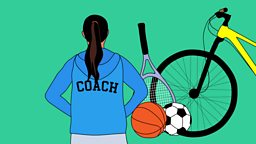Five reasons why more women should get into sports coaching (and how to actually make it happen)

Just 30 percent of sports coaches are female and of newly qualified coaches each year, only 17 percent are women, according to recent research by sports coach UK.
In UK Coaching Week, 大象传媒 Radio 4’s Woman’s Hour spoke to two women to find out why sports coaching can be such a rewarding opportunity and how women can take on the roles.
Kim Johnson coaches rugby for Camberley Cocktails and Louisa Arnold is a netball coach and the Coaching Network Officer for Project 500 - a scheme to inspire and support women to become sports coaches.
Here are their five reasons why more women should get into sports coaching, and how to actually make it happen.
Why women should get into sports coaching

1. You can inspire other women
“The main reason to get women into coaching is just to show that women are out there doing what men do”, says Kim Johnson. “I’m actually from a rugby background and it’s a very male dominated sport but there’s lots and lots of girls that want to play. They feel that they can’t because they think that it’s a man’s domain.
“The more role models we have, the more female players, coaches and referees we have, the more we’re going to inspire and encourage the next generation of girls to come and take it forward.”
2. Coaching is accessible to anybody
“If you’ve been a player, a supporter, the person who’s made the tea or brought the squash, there are other ways of involving yourself with any sport”, according to Kim Johnson.
“Coaching is accessible to absolutely everybody. You can participate in some coaching courses from the age of 14 so it’s a really great way for girls to either get them involved in sport or continue their involvement in sport. They can tie it in with their GCSEs and what you’re looking for is to just get that ripple effect of getting as many female role models out there participating in whatever sport you enjoy and giving that positivity back to your friends and colleagues.”
3. Coaching is about doing something for ourselves
“Another reason to get into coaching is that It’s also about doing something for yourself”, says Louisa Arnold.
“Lots of roles that women have throughout life are about helping other people. Yes, [coaching] is about helping other people, but it’s also giving yourself something back and proving to yourself that you can go out there, stand in front of a group of people and share your passion and enthusiasm for sport and physical activity.”
4. It can enrich your life
“Coaching is one of the best things that I do in my life”, says Louisa Arnold. “It’s given me the opportunity to stay in a sport that I love because I can’t play anymore because I’m injured.
“It’s a fantastic opportunity to meet new people, the participants you meet enrich your life, you learn so much. For me, I laugh every time I’m at a session.”
5. It gives young women useful skills
“We do quite a lot of work with young, female coaches and we’re really keen that they then have that confidence to take that on into their future career”, says Louisa Arnold.
“So one of the things around coaching is, yes it could be your career if that’s what you want it to be, but it could also give you skills that take you so far in wherever you want to go.
“Confidence is a huge skill you benefit from, it’s often a reason why women don’t apply for opportunities in jobs and what we’ve seen from female coaches and Project 500 is supporting people to get into coaching and then they’ve progressed on.
“One female coach that I met, she started off as a teaching assistant, she then moved on to work for her local FA. She’s now an FA-licensed Advanced Youth award coach, so for her experience, she’s now mentoring other coaches. She’s given communication skills, all those sorts of things.”
How to get into sports coaching

1. Talk to your coach
“First step is to...have a conversation with a coach. If you’re a participant yourself, the coach is always happy to chat with you”, says Louisa Arnold.
“Maybe just observe to start with, you don’t need to lead the session, you don’t need to do the course straight away. You can be a helper, you never actually need to get a qualification if you just want to help.
“But if you do want to progress on and lead in coaching, then we’d encourage you to get a qualification.”
2. There are lots of organisations to help get you started
“If you’re going to become a coach, the best way to do that is to contact your governing body of whatever sport you’re looking at”, says Kim Johnson. “They will have coaching awards and courses that are designed to help you become the best person you can be on the pitch.”
Louisa Arnold suggests taking a look at Project 500. “Project 500 is online...and if you want some top tips and ways to get started, they can direct you to your local sport, but they can also direct you to your local area. There are active partnerships across the country and whatever county that you live in, you’ll be able to access some support in terms of your next steps and coaching.”
She also suggests looking at UK Coaching. “UK Coaching have got a whole wealth and range of resources online that you can access to support your journey into coaching. If it’s your first steps or you’re already coaching, check out the resources that they have.”
3. Believe that you can do it
“Believe that you can do it”, Louisa Arnold says. “Lots of women think it’s not for them, but actually so many of the skills that you have; you’re really good at engaging with people, you want to have a conversation, coaching is so much about conversations, so why don’t we do it more and share that passion with other people?”
“I took a little leap of faith so I highly, highly recommend that you do exactly the same”, says Kim Johnson. “You will not believe the friendships you make, the confidence it gives you. It can actually be a life-changer. Come and join us.”
You can listen to the full Woman's Hour discussion on female sports coaching here.
Woman's Hour is on 大象传媒 Radio 4 on weekdays at 10am and at 4pm on Saturdays. You can catch up on all episodes via 大象传媒 Sounds.



